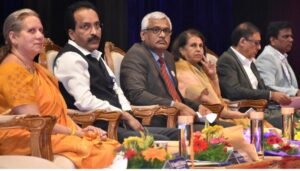Overview

The 9th International Food Convention, IFCoN-2023, kicked off in Mysuru on Thursday, drawing food scientists and technologists from nationwide and beyond. This quadrennial event, organised by the Association of Food Scientists and Technologists (India) in collaboration with central research institutions, served as a significant gathering for professionals in the field.
The event’s inauguration saw ISRO Chairman S. Somanath taking the lead, with esteemed guests in attendance. Pramoda Devi Wadiyar of the erstwhile Mysore royal family, CSIR-CFTRI Director Sridevi Annapurna Singh, and DRDO-DFRL Director Anil Semwal added to the dignified presence. Meanwhile, N. Kalaiselvi, the secretary of the Department of Scientific and Industrial Research and DG, CSIR, New Delhi, participated virtually as the chief guest.
What is IFCoN?
IFCoN, short for the International Food Convention, is an event organised by the Association of Food Scientists & Technologists (India). It serves as a global platform that brings together experts, researchers, and food science and technology professionals. The convention explores various facets of the industry, emphasising innovation, safety, sustainability, affordability, and security within the food ecosystem.
![]()
The latest edition, the 9th International Food Convention (IFCoN-2023), will take place in Mysuru from December 7th to 10th, with a thematic focus on “TRIMSAFE – Technology Re-engineering for Innovation and Mitigating the Risk for a Safe, Sustainable, Affordable & Secure Food Ecosystem.”
The event features technical sessions, discussions, and a mega Food Expo, providing a unique opportunity for global stakeholders, including researchers, industry professionals, and educational institutes, to exchange knowledge, network, and explore potential collaborations in the ever-evolving food science and technology field.
The 9th edition of IFCON, the International Food Convention, is organised by the Association of Food Scientists and Technologists of India (AFSTI), with collaborative support from prominent institutions. These include CSIR-CFTRI, DRDO-DFRL, and CSIR-Indian Institute of Toxicology Research, Lucknow.
 What are the major themes of IFCoN?
What are the major themes of IFCoN?
The 9th IFCoN 2023 delved into an array of significant sub-themes, encompassing the diverse landscape of food science and technology.
- Chemistry of Foods
- Food for Health & Wellness
- Millets as Nutri-Cereals
- Innovative & Intelligent Engineering & Technological Advances in Food Chain
- Food Ingredients, Enzymes, and Additives
- Green Food Processing, Preservation, and Sustainable Packaging Solutions
- Future Foods
- Traditional and Ethnic Foods
- Dairy and Animal Food Products
- Food Grains and Baking Technology
- Food Supply Chain Logistics (including digital food marketing)
- Food Microbiology
- Food Biotechnology and Fermentation Processes
- Food Safety and Analytics (including regulation)
- Circular Economy in Food Chain
- Sustainable Food Waste Management
- Processing Preservation and Shelf Life of Food Products
- Leveraging the Science of Sweeteners to Address the NCD Challenge in India
Each sub-theme provides a nuanced exploration into critical aspects of the food industry, showcasing the multidisciplinary nature of discussions and advancements during the convention.
What did the chief guest, Dr S Somanath, say?
During the event, Dr Somanath highlighted ISRO’s significant role in supporting India’s agriculture sector by utilising satellite data for crop forecasting and pest management. He elaborated on ISRO’s initiatives, particularly in remote sensing, which have proven valuable in furnishing crucial information to farmers.
Dr. Somanath emphasised the close connection between the field of food science and agriculture. He believed that further technological interventions could be pivotal in enhancing the agricultural sector.
Such advancements have the potential to assist farmers in improving crop yields, and concurrently, there is room for expansion in the domains of food processing and value addition. In essence, integrating technology into agriculture is the key to fostering growth and efficiency in the broader food ecosystem.

Dr. Somanath, in addressing the domain of food storage and processing, emphasised the crucial role of food scientists. He highlighted the potential for these experts to enhance the shelf life of foods and provide insights into selecting foods with high nutrient value, particularly in addressing lifestyle diseases.
Moreover, Dr. Somanath underscored the significance of low-cost food processing technologies as a catalyst for generating employment opportunities within the country. While acknowledging the importance of automation, he also stressed the need to balance it with employing the population.
According to him, integrating food processing technologies contributes to improved efficiency. It plays a pivotal role in bolstering employment opportunities and fostering harmonious development in the sector.












Comments 1